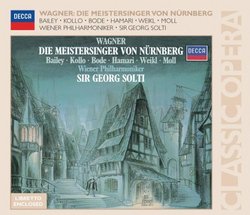| All Artists: Richard [Classical] Wagner, Georg Solti, Vienna Philharmonic Orchestra, Adalbert Kraus, Adolf Dallapozza, Bernd Weikl, Gerd Nienstedt, Hannelore Bode, Helmut Berger-Tuna, Julia Hamari, Kurt Moll, Kurt Rydl, Martin Egel, Martin Schomberg, Michel Sénéchal, Norman Bailey, René Kollo, Rudolf Hartmann, Werner Klumlikboldt, Wolfgang Appel Title: Wagner: Die Meistersinger von Nürnberg Members Wishing: 1 Total Copies: 0 Label: Decca Original Release Date: 1/1/1975 Re-Release Date: 5/10/2005 Genre: Classical Style: Opera & Classical Vocal Number of Discs: 4 SwapaCD Credits: 4 UPC: 028947566809 |
Search - Richard [Classical] Wagner, Georg Solti, Vienna Philharmonic Orchestra :: Wagner: Die Meistersinger von Nürnberg
 | Richard [Classical] Wagner, Georg Solti, Vienna Philharmonic Orchestra Wagner: Die Meistersinger von Nürnberg Genre: Classical
|
Larger Image |
CD Details |
CD ReviewsBanging the Drum J. H. Gaulard | London United Kingdom | 01/31/2007 (5 out of 5 stars) "The only point in adding anything to RCL's remarkable review of this set of Meistersinger is just to make clear that this underrated recording needs to be seriously rehabilitated. I strongly encourage happy owners of this set to come on Amazon and share their enthusiasm, because this 4 CD-set is a hidden gem. Amazingly, Solti himself complained about the orchestra having a bad day, the singers having a bad day and even the conductor having a bad day. Maybe because he was supposed to have Ridderbusch as Sachs and Fischer-Dieskau as Beckmesser, and ended up with a second-choice cast. In any case, he re-recorded Meistersinger 20 years later in Chicago, but his initial 1975 effort (reviewed here) was really not worth all this hatred (generally shared by professional reviewers). In any case the "second-choice" cast ends up being more than "world-class" on this occasion. The team of singers assembled here were pillars of Bayreuth in the 1970s and were used to perform as a team together, particularly in these parts. Norman Bailey makes for a fantastic Hans Sachs, much more convincing than his Hollander: the voice is ample and secure, the ensembles are fantastic, the Wahnmonolog very moving and the "Verachtet mir" is absolutely HUGE. This Hans Sachs is clearly an "action man", determined to save Walther - at whatever the cost. Bailey may portray a single-minded cobbler, but this is very efficient - and very musical too. Hannelore Bode makes for a young, enthusiastic Eva. Listen to her "Oh Sachs mein Freund", there is a lot of impetuosity and abandon in the singing here. Bernd Weikl makes for a fantastic Beckmesser because he was very young at this stage of his career, so the voice is in glorious shape: Weikl sings every line of the part - a change versus common practice. Kollo remains in my view a really good Walther: a very sunny upper register, a bit less ease than with Karajan five years earlier but still exactly the lyrical qualities that should be expected from this part. It is also worth noting a very virtuoso David by Dallapozza and a rather tame Magdalene by Hamari. This recording also owes a lot to Solti. All the singers, as I have pointed out before, are all stage animals, well-used to their parts but Sir Georg also helps by always moving the story forward: there are no moments of contemplation that were plaguing his Lohengrin...By listening to this Meistersinger I really had the feeling of a consistent theatrical performance, not a studio-based effort. I think that the usual enthusiasm of the conductor and the stage experience of the singers make for a very exciting recording, strongly recommend. Sachs fans will want to hear Friedrich Schorr in the part (with Rethberg and Bodanzky conducting, 1936, MET) as well as Paul Schoeffler (in Abendroth - Bayreuth 1943 or Bohm - Vienna 1944). Don't forget Ferdinand Frantz either with Kempe in Berlin 1956). " Inspiration for listening to opwe A. Douglas Ordunio | Glendale, CA | 01/25/2010 (5 out of 5 stars) "This was the recording that turned my head around about opera when it was first released. When I heard the end of the second act, it coerced me to listen to the Ring, Tristan, Fligende Hollander, and others. There is nothing like it in the recorded repertoire! An amazing performance. Splendidly recorded and performed. I don't think there is another Meistersinger like it. The end of the second act is the benchmark for all recordings of Wagner's sole comedy." Better than Karajan's Meistersinger thanks to a better Sachs KC | London, England | 12/13/2007 (5 out of 5 stars) "Bailey is a huge improvement over Theo Adam as Sachs for Karajan. The orchestral detail is first rate. I prefer this to Kubelik's, Karajan's and Sawallisch. The cast are all strong. Kollo as Walther is the same as in the Karajan set recorded five years earlier. It is a pity Solti didn't have a Vicker's or even Domingo (even with his latin pronunciation). Walther would be better with more heft in the voice. However, Kollo is reliable and has a youthful tone. I prefer him to Konya in Kubelik's set, whom everyone seems to rave over. I can hear no noticeable deterioration from Kollo's Karajan recording in 71. Even Solti's Beckmesser is an improvement over Karajan's. I think this has to be one of the best studio Meistersingers available. It has no serious weaknesses at any rate. Worth the investment."
|

 Track Listings (13) - Disc #1
Track Listings (13) - Disc #1